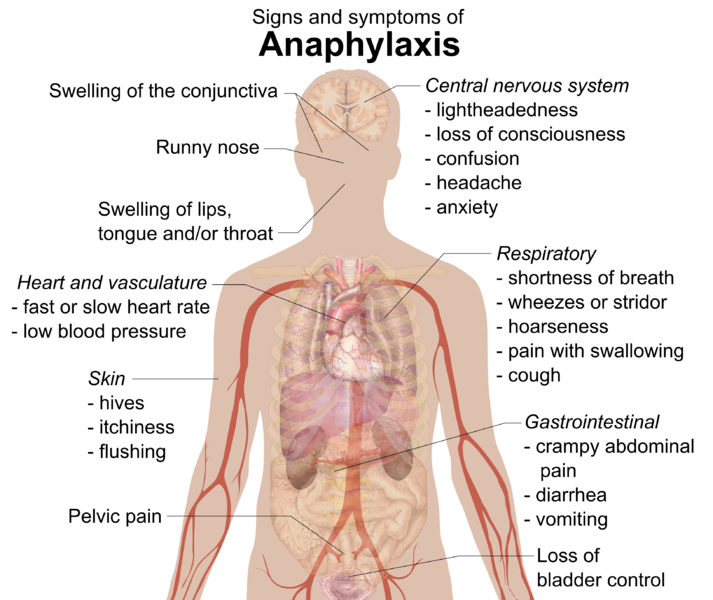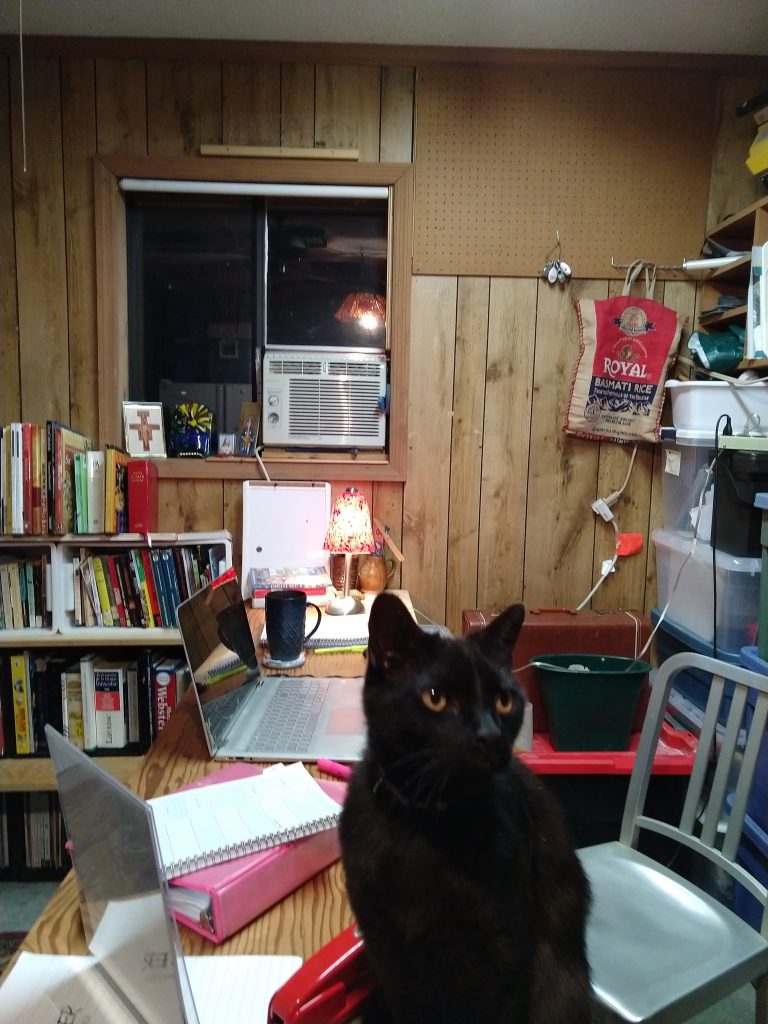Thought I’d share a little mild excitement we had around our house yesterday (everyone’s fine), because if you don’t live in the world severely-allergic people, and you don’t have first-aid training on the topic, a sudden introduction to the world of severe allergic reactions (that’s what “anaphylaxis” is) can leave you responsible for making life-and-death decisions, and maybe not even knowing it. Hence today’s PSA, while it’s on my mind.
#1 Anyone can develop a severe allergy at any time.
Let me tell you a funny family story, and then I’ll tell you about yesterday.
My maternal grandfather never in his life showed any sensitivity to poison ivy. He grew up on a farm, he had plenty of exposure through out all his childhood and young adulthood, he was just a lucky guy that way. So the family — this was when my mom was a kid — was traveling cross-country from one Navy post to the next, and they stopped at various parks along the way. They were out hiking and came across some poison ivy. Someone, probably my grandmother, urged everyone to be very careful to avoid it. And my grandfather, who could be like this, I suppose, was like, “Nah! I never get poison ivy! I’m not allergic!” and he made a point of proving it by intentionally rubbing the stuff on his skin.
Reminder: He’d done this before. Whether as a boast or not, I don’t know, but it would not be inconceivable that as one of seven brothers he’d maybe pulled this party trick a time or two in the past. Certainly, many times he’d known he’d been in contact and had no reaction.
Much in accord with my mother’s sense of poetic justice, that day was his day, and the bragging was rewarded with the worst case of poison ivy rash anyone in the family had ever encountered.
Morals of the story:
- Pride goes before the fall, but also . . .
- You can have a reaction to something that, until now, has never been a problem for you whatsoever.
Curiously, to my knowledge I’ve never had a poison ivy rash either, though I’ve never knowingly put that to the test. I’m hoping that humility and lucky genetics are quietly protecting me when I accidentally end up exposed (because: having never had the rash, I didn’t go through the phase the all other Scouts go through where they suddenly take a keen interest in that one plant-identification skill — though I think I’m caught up now).
***
My story, both from earlier this spring and then yesterday, topic now transitioning to bee/wasp stings:
I’ve never had any difficulty with insect stings. I don’t seek out trouble, but also stinging insects don’t worry me much, because they’re an annoyance not a danger. We do of course take action to eliminate potentially dangerous hives and nests as we identify them, for both comfort and safety reasons. But also I delight in having bumblebees visit my garden. Stinging things? No problem.
So. This spring while gardening I accidentally uncovered an underground yellow jacket nest in the flower garden. I didn’t realize what was happening until after the first sting hit, and by the time I’d come to my senses and calmly exited, I had three or four stings on my wrist.
Not a problem. Go clean up, apply miscellaneous home remedies for comfort (as if), take a Benadryl just to be careful, since it was multiple stings. Affected area was painful and slightly swollen, and then it got better, and until then I wore my watch on the other wrist. Eliminated nest, since it was in a heavily-trafficked area and posed a potentially serious hazard if someone disturbed it. Done. Not a big deal.
So. Yesterday. Mowing the lawn. I was just wrapping up the morning’s mowing, and finally dealing with an unsightly spot by the street that needed a few goings-over, because it can get a little Wild Kingdom around here. At no time was I aware of any bees or wasps where I was mowing, because duh, I’m not going to mow over a yellow-jacket nest, we know how that goes. (Tip: Kill the nest, live with long grass until times. Mowing over an underground nest is courting death, that is not an exaggeration that is a fact.)
But, I did get stung by something. Didn’t know what — possibly fire ants since it was on my lower leg, who knows — wait, no, that’s something for serious because the stinging continued. I did that amusing-to-watch thing one does where you attempt to both exit the area and simultaneously find this moving creature or creatures, hidden, unidentified, who has turned your clothing into a guerilla outpost from which to wage war.
By the time I’d gotten to the bathroom to hose off whatever-it-was (the easiest way to get a swarm of fire ants off your body fast is via deluge), it turned out to be a yellow jacket now somehow safely dead in my shirt and having bitten my leg four times.
Okay. Great. Thank you yellow jacket, because three of those stings were under my shorts, and that is not a real pleasant place to have a week of misery.
Still, no reason to worry. Took a quick shower (because just finished mowing lawn, however abruptly), took a Benadryl just to be careful, and then moved on to making lunch, since it was that time.
Remember: I am not allergic to insect stings, right? I’ve got forty-some years of practice being stung by all-comers, not that often but often enough to know that this is not a problem for me. I’m the person you send to deal with the stinging insect so the allergic person can stay far away.
We had a nice lunch on the screen porch, spouse and I made a mental note to locate the nest (we still haven’t found it, by the way — it’s good and hidden), and things were —
Whoa. I happened to glance down at my legs and discovered I was completely covered in red spots. Legs, arms, parts of my face and neck.
Now I had noticed my face felt a little hot earlier? But remember I was just out mowing the lawn in a bazillion-degree weather — being a little flushed for a while is par for the course. Didn’t occur to me to check for hives or a rash or anything, because I have *No History* of allergic reactions to insect stings. None.
So what is our lesson #1 for today: Someone who has no history of an allergy to a thing can, at any time and without notice, suddenly develop a severe allergic reaction.
#2 So then what?
Anaphylaxis is the name for that massive, severe, allergic reaction that can happen to anyone at anytime, with no prior notice whatsoever.
A localized rash where you physically contact the thing you are allergic to is just a mild reaction. When you suddenly get a rash all over your body, or in places far from the affected area, that’s when you’re seeing one of the (less dangerous) signs of anaphylaxis. It’s a concern because less-dangerous signs can be the precursor to more-dangerous signs, and the more-dangerous signs are deadly.
So what do you do?
Here’s an infographic from FARE that lays it out: Recognize and Respond to Anaphylaxis Poster
Notice that they put skin reactions in the category of symptoms that call for administering epinephrine and calling 911. That’s a little different from the protocol out of Allergy & Anaphylaxis Australia, which considers skin and digestive reactions to be part of the mild-to-moderate category, but, and here’s the money question: These milder symptoms (such as my rash) can be the lead-in to deadly anaphylaxis.
Note here: Because I have no history of severe allergy, we don’t have an Epipen sitting around the house. There’s always a first time.
Note also: If you need to use an Epipen, you need to be transported. Even if you have one on hand and you use it and it works. You still need to go to the ER.
So what did we do? We went Australian Rules. (Here I am just telling you my story, not giving you advice. See that story above about the guy who died in ten minutes even with paramedics giving epinephrine.) I had my adult son drive me to the very-nearby urgent care affiliated with our hospital system, where as soon the nurses milling around caught a whiff of the word “Anaphylaxis” while I stood there calmly registering at the front desk, they pulled me back for evaluation and confirmed my airway was in good shape (it was, or I would have been at the ER getting my airway opened, thanks).
So, Noting Again: If you might need an Epipen, you need to get medical attention.
Since my reaction did not involve my airway, the physician overseeing all this went with a period of observation to make sure I didn’t segue into delayed-onset of breathing difficulties, and in the in meantime began a course of treatment for the symptoms I was having; after everyone agreed I was good to go, I was discharged with instructions and a follow-up plan.
This is where I copy and paste authoritative instructions . . .
These are the emergency guidelines from from Australia Allergy & Anaphylaxis:
If you believe someone is experiencing anaphylaxis you MUST GIVE the adrenaline (epinephrine) autoinjector (e.g. EpiPen®) according to instruction on the ASCIA Action Plan.
| If you DO NOT have an adrenaline autoinjector:
Lay person flat – do NOT allow them to stand or walk
If unconscious, place in recovery position
If breathing is difficult allow them to sit.
CALL AN AMBULANCE |
ADRENALINE IS LIFE SAVING medication for someone experiencing a severe allergic reaction/anaphylaxis.
Antihistamines DO NOT stop the progression of an anaphylaxis. Antihistamines only help to decrease itching and reduce mild/moderate swelling of the face, lips and eyes.
DO NOT SHOWER as this may contribute to a drop in blood pressure which can escalate the severity of an allergic reaction.
ALWAYS give adrenaline autoinjector FIRST, and then asthma reliever puffer if someone with known asthma and allergy to food, insects or medication has SUDDEN BREATHING DIFFICULTY (including wheeze, persistent cough or hoarse voice) even if there are no skin symptoms.
[FYI I removed the phone number for CALL AN AMBULANCE since that varies by country. But if you were curious, in Australia its 000. Travel tip: Learn the local emergency number in places you are visiting abroad. You could tape it to your cell phone, for example, since otherwise you’ll probably forget it.]
And now a few practical suggestions from my own brain . . .
If you’re not an “allergy person” the first time you experience a severe allergic reaction is gonna be a shocker. The whole page from which I excerpted above has yet more suggestions on how to manage terrible situations.
A couple points I’d like to emphasize:
- Don’t be alone. If you are experiencing milder symptoms, you have no way of knowing what and then is going to be like. Maybe nothing, but maybe something that requires someone helping you right away.
- One of the realities of a milder allergy-emergency is that you could have a panic attack that mimics airway symptoms, especially if you are alone and worried. Getting yourself not-alone and then into a place where you can get epinephrine if you need it is a good way to cause the panic attack to subside.
- If you present at the ER with milder symptoms and probably you just need to be observed and plan a course of treatment and follow-up for your nasty rash, LET THE THE STAFF KNOW IMMEDIATELY ON ARRIVAL that at any time you might start with airway symptoms, because that’s how anaphylaxis rolls sometimes, and they need to know that so that if you are all the sudden frantically banging on the glass begging for help, that is what is going down, don’t mistake me for SuperKaren, get me to an airway.
- You don’t have to shout. Tell them nice and calmy and firmly and make them repeat it back so they definitely understand. Also write the word “Anaphylaxis” on your intake card, first thing before you even write down your name, so the nurses wake up and do their thing. Don’t just write “weird rash.” You’re not there because you’re worried your skin isn’t pretty. You’re there because your milder-symptoms could turn into deadly symptoms in the next few hours, and these are the people who can keep you alive if that should happen.
- Of course be calm and polite if your breathing is fine and the staff are doing what they need to. But put that word ANAPHYLAXIS in front of their face so that they know to do all the things.
- Don’t worry that you are bothering anyone by “overreacting” if your symptoms are confusing and you aren’t sure if your allergic reaction is serious or not. This is what your local emergency-care providers are there for, and also they get paid, so it’s not like you’re interrupting tea time or something.
Okay, that’s today’s PSA. Share it around if there’s someone you know who needs to see this.

Image courtesy of Wikimedia, CC 1.0. Here’s a link that gives you the text and more info re: Signs and Symptoms of Anaphylaxis.













